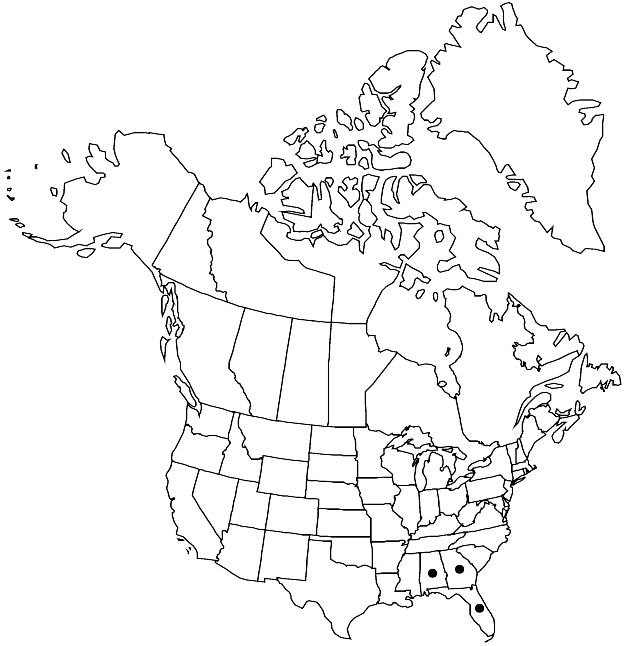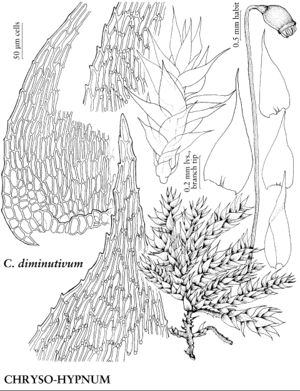Difference between revisions of "Chryso-hypnum diminutivum"
Brittonia 36: 182. 1984.
FNA>Volume Importer |
FNA>Volume Importer |
(No difference)
| |
Revision as of 22:05, 16 December 2019
Stems 4 cm, branches usually simple, short, blunt, densely foliate; epidermal cells small, walls thick, in 2 or 3 rows, surrounding larger, thinner walled cells, central strand small; rhizoids along underside; axillary hair basal cell 1, distal cell 1, relatively short. Stem leaves 0.8–1.2 mm; apex gradually and narrowly acuminate; costa unequal, one fork often ending 1/3–1/2 leaf length; alar cells in 6–12 rows in extreme basal angles; laminal cells linear to oblong-linear, walls firm; basal cells shorter, broader. Branch leaves usually wide-spreading, sometimes more imbricate, lanceolate to ovate-lanceolate, concave, 0.6–0.9 mm; costa unequal, one fork often ending 1/4–1/3 leaf length; alar cells in 4–10 rows in extreme basal angles. Perichaetial leaves 0.7–1.4 mm, margins plane, sparsely serrulate, costa often well developed, sometimes ecostate, alar cells not differentiated, laminal cells smooth or low-prorulose at distal ends abaxially. Seta twisted. Capsule 0.7–1.1 mm, neck usually differentiated; exothecial cells quadrate to short-rectangular, vertical walls firm, cross walls thin and wavy; annulus 1–3-seriate, falling early, cells elongate, walls thick; exostome teeth shouldered, bordered, internal surface trabeculate; endostome basal membrane smooth or obscurely roughened, segments finely papillose, perforate, cilia finely papillose. Spores 11–19 µm.
Phenology: Capsules mature winter.
Habitat: Dead wood, mesic forests
Elevation: low elevations (0-100 m)
Distribution

Ala., Fla., Ga., Mexico, West Indies, Central America, n, c South America.
Discussion
Chryso-hypnum diminutivum is distinguished by often dense, soft mats of smallish, prostrate, subcomplanate-foliate stems with ovate leaves whose laminal cells are prorulose at both ends; the plants are common lowland weeds. The species is extremely common throughout the West Indies and northern South America at all but the highest elevations, but barely makes it into North America. The species is widespread in tropical America, with many synonyms.
Selected References
None.
